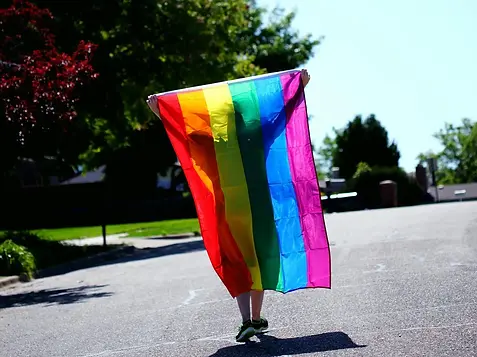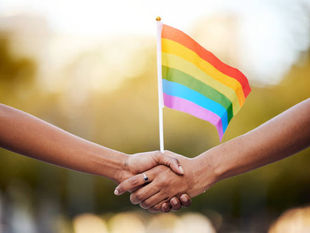Relationships. Change. Life.

SPECIALTIES
LGBTQIA Therapy
Home > LGBTQIA Therapy
Is A Sense Of Acceptance Or Affirmation Missing From Your Life?
Are you a member of the Lesbian, Gay, Bisexual, Trans, Queer, Intersex, or Asexual (LGBTQIA+) community and searching for effective mental health support? Do questions about your identity cause you to feel lost and aimless in your search for the answers to life’s daunting questions? Or has an instance of LGBTQIA discrimination or intolerance resulted in feelings of fear and rejection?
Perhaps you’re tired of being pathologized. If you’ve tried therapy in the past, you may have been misunderstood or even traumatized by a clinician who failed to demonstrate cultural competence and genuine inclusivity. Or maybe the rejection you feel stems from negative experiences you have had at work, in your community, or within your family of origin.
A sense of shame may have caused you to hide your true identity. Maybe you’re in a relationship that you’ve kept secret from your friends, family, or coworkers. Or perhaps you feel like you are living a double life that keeps you from achieving a truly authentic and intentional existence.
Given instances of discrimination and intolerance, members of the LGBTQIA community face more hurdles to their mental health than the general population. You may struggle with symptoms of anxiety and depression—such as hypervigilance and hopelessness—and it might be difficult to feel safe and secure in your surroundings. It’s possible you’ve survived some form of trauma, including bullying, assault, or harassment, that has tested your emotional resilience.
All you want is to feel accepted by yourself and the world around you. And in LBGTQIA counseling at Through Therapy Collective, you can clarify your needs and establish a path forward with a clinician who cares.
The LGBTQIA+ Community Faces Increased Obstacles To Mental Health
Research supports that LGBTQIA individuals experience mental health challenges at disproportionate rates—especially challenges related to anxiety and depression disorders. In fact, a 2015 study shows that those who identify as queer are twice as likely to experience a mental health condition than their cisgender, heterosexual (cis-het) counterparts. And trans individuals, in particular, are four times more likely to develop a mental health condition when compared to the cis-het population.
There are many reasons for these mental health discrepancies—including systemic prejudice and a lack of access to inclusive mental health and medical providers. But so many of these challenges can be boiled down to cultural fears and ignorance. There remains a general misunderstanding of the LGBTQIA communities, and this population still has to contend with a lot of stigma, stereotyping, and violence. Not to mention, outdated and intolerant religious dogma continues to drive many cultural standards.
Unfortunately, LGBTQIA folx are the ones forced to pay the price of societal ignorance. Increased instances of mental health often indicate a higher prevalence of substance abuse and addiction (learn more). And because of our society’s long history of violence toward queer and trans individuals, these already marginalized individuals are put in the position of constantly having to assess their surroundings and those around them to ensure their safety. Naturally, this weighs on the psyche and further perpetuates the cycle of trauma that has adversely affected this population for generations on end.
It’s true we are making progress in civil rights and reducing instances of discrimination toward LGBTQIA folx. However, there is still much education, awareness, and inclusivity to achieve by society at large. And until then, queer, trans, asexual, and nonbinary individuals are likely to experience mental health struggles at an increased rate.
Yet despite all these odds, it’s possible to feel seen, accepted, and embraced within your community. At Through Therapy Collective, you can find a clinician who will validate your experience, affirm your identity, and provide a pathway to healing.
Ready to take the next step or have a question? Reach out today.

LGBTQIA Therapy Can Instill You With A Sense Of Peace And Self-Acceptance
Identifying as LGBTQIA, you may often feel unsafe, insecure, or misunderstood. However, our therapists are committed to providing a safe and inclusive atmosphere where you can bring your whole self to explore your experiences without fear of judgment.
Beyond providing you with a refuge, we aim to affirm your identity while working to understand your story’s unique elements and instill a sense of confidence in the therapeutic process. To this end, we will always use your preferred pronouns and identification markers.
LGBTQIA therapy begins with an initial session during which your therapist will go over your specific challenges, symptoms, and goals for counseling. History-taking will be paramount to this process as we learn more about the unique adversities you’ve faced and the ways in which they have shaped your outlook on the world. This information will be gathered in collaboration with your treatment plan so that we can create individualized and distinct goals for therapy.
Our team draws from a wide variety of therapeutic approaches meant to target trauma, increase self-esteem, and create effective communication skills for setting meaningful boundaries. Such approaches may include behavioral methods—like Cognitive Behavioral Therapy (CBT) and Dialectical Behavior Therapy (DBT)—geared toward adjusting your relationship with your emotions. Or Accelerated Resolution Therapy (ART) and Trauma-focused CBT may be used to help you resolve internalized distress. In addition, Emotionally-Focused Therapy (EFT) can be used in the context of specific relationship issues or LGBTQIA couples counseling.
Regardless of our approach, we are dedicated to tailoring the LGBTQIA therapy process to align with your specific language, values, and goals. And given our high degree of cultural competence and commitment to inclusion, we are confident that our therapy services can effectively promote healing, ultimately improving the lives of our LGBTQIA+ clients.
It’s possible to feel a greater sense of peace, calm, and self-actualization while establishing a safe community in which you can feel secure. A life of healthy relationships with yourself and others is possible, and the best way to it is Through.

Maybe you’re wondering if it’s time to see an LGBTQIA therapist, but you have some questions…
Though I identify as LGBTQIA, I am not really looking to explore issues of my identity in therapy.
As with any population, the LGBTQIA community is full of nuanced and unique individuals. We understand that regardless of your gender identity or sexuality, you may be looking for therapy to help you pinpoint issues of grief, loss, transition, trauma, or other distress. As such, we will take your lead in therapy and explore the topics that are meaningful to you. We don’t have an agenda, nor will we ever pressure you into discussing aspects of your identity that you’d rather not discuss.
How can I be confident that a therapist will relate to me as someone who identifies as LGBTQIA?
Our team of therapists is devoted to creating a safe therapeutic atmosphere for all of our clients—especially those from traditionally marginalized communities. Cultural competence and inclusion are of the utmost importance at our practice. We continue our learning through ongoing education, training, and dialogue to help us become the most effective mental health professionals possible. And we hold our clinicians to a high standard of inclusion and awareness, only hiring professionals whose values directly align with those of our practice.
My friend / coworker / family member just came out as LGBTQIA+. How can I show my support?
Being an effective ally means committing to staying present, understanding, and empathetic in the relationship you have with someone who is LGBTQIA. If you love someone who has just come out, it’s important to listen, validate their emotions and experiences, and treat your loved one with a sense of dignity and understanding. And if you think they are struggling with their mental health, you may suggest LGBTQIA therapy or even consider it for yourself, as we are happy to work with allies on the path to healing.


You Can Learn To Feel Embraced And At Home In Your World
If you identify as LGBTQIA and need effective counseling, the therapists at Through Therapy Collective are culturally competent professionals who can aid you on the path to healing.
For more information about how we can help or to schedule a free consultation, please email us.







